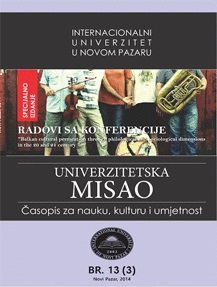PROŽIMANJE I ODBRANA IDENTITETA
PERMEATION OF IDENTITY AND ITS DEFENSE
Author(s): Sefer MeđedovićSubject(s): Political history, Social history, Transformation Period (1990 - 2010), Inter-Ethnic Relations, Ethnic Minorities Studies, Politics and Identity, Identity of Collectives
Published by: Интернационални Универзитет у Новом Пазару
Keywords: Identity; assimilation; national minorities; XX century; Yugoslavia;
Summary/Abstract: At the end of the twentieth century there was a disintegration of Yugoslavia, together with all the values that it undoubtedly possessed. On the causes of its disappearance a lot is said, in literature, films, various broadcasts, commentaries and scientific conferences. It seems to me that Yugoslavia collapsed because it did not posses its own identity, even though the federal institutions radiated confidence both at home and abroad. Actually it turned out that brotherhood and unity, self-government and joint work were merely provisional and a facade. Had the Yugoslav identity been more tightly constructed, the state would not have fallen apart in four terrible wars, but would remain and be even more stable, and the defeated forces would realize that force can not defeat independence, even more the force was used by the powers that fought for the victory of their identity. Identity is the essence of a being that is expressed. Thus, the personal identity is unity of personality that is in the basic characteristics different from other personalities. Identity is a layered creation and implies the process of its formation. In addition to the personal, there is collective identity (ethnic, national, etc.). The twentieth century witnessed a lot of problems in the defense of national identity, revealed assimilatory attempts of the majorities over minorities, but also pointed out to poltroons within their own ranks. It's hard to break away from the embrace of the larger (the ratio of Serbs and Montenegrins in Montenegro) and preserve their own national being without a state (the case of the Bosniaks in BiH) and also to experience that from a single federal state such was Yugoslavia, where the Bosniaks were the constituent people, live in several countries as national minority, with significantly narrowed possibilities for expression of the grandeur and wealth of its own identity.
Journal: Univerzitetska misao
- Issue Year: 2014
- Issue No: 13 (3)
- Page Range: 275-285
- Page Count: 11
- Language: Bosnian

